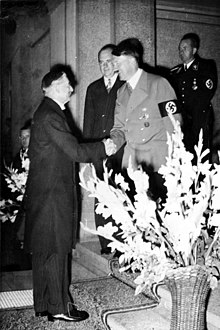
| Part of a series on |
| War (outline) |
|---|
 |
Appeasement, in an international context, is a diplomatic negotiation policy of making political, material, or territorial concessions to an aggressive power with intention to avoid conflict.[1] The term is most often applied to the foreign policy between 1935 and 1939 of the British governments of Prime Ministers Ramsay MacDonald,[a] Stanley Baldwin[b] and most notably Neville Chamberlain[c] towards Nazi Germany[d] and Fascist Italy.[e][2] Under British pressure, appeasement of Nazism and Fascism also played a role in French foreign policy of the period but was always much less popular there than in the United Kingdom.[3]
In the early 1930s, appeasing concessions were widely seen as desirable because of the anti-war reaction to the trauma of World War I (1914–1918), second thoughts about the perceived vindictive treatment by some of Germany during the 1919 Treaty of Versailles, and a perception that fascism was a useful form of anti-communism. However, by the time of the Munich Agreement, which was concluded on 30 September 1938 between Germany, the United Kingdom, France, and Italy, the policy was opposed by the Labour Party and by a few Conservative dissenters such as future Prime Minister Winston Churchill, Secretary of State for War Duff Cooper, and future Prime Minister Anthony Eden. Appeasement was strongly supported by the British upper class, including royalty, big business (based in the City of London), the House of Lords, and media such as the BBC and The Times.[4]
As alarm grew about the rise of fascism in Europe, Chamberlain resorted to attempts at news censorship to control public opinion.[5] He confidently announced after Munich that he had secured "peace for our time".[6]
Academics, politicians and diplomats have intensely debated the 1930s appeasement policies ever since they occurred. Historians' assessments have ranged from condemnation ("Lesson of Munich") for allowing Hitler's Germany to grow too strong to the judgment that Germany was so strong that it might well win a war and that postponing a showdown was in the best interests of the West.
- ^ "Appeasement — World War 2 on History". www.history.co.uk. Archived from the original on 4 April 2013.
{{cite web}}: CS1 maint: unfit URL (link) - ^ Mallett, Robert (1997). "The Anglo-Italian war trade negotiations, contraband control and the failure to appease Mussolini, 1939–40." Diplomacy and Statecraft 8.1: 137–67.
- ^ Hucker, Daniel (2011). Public Opinion and the End of Appeasement in Britain and France. London: Routledge (published 2016). ISBN 978-1-317-07354-3. Retrieved 12 October 2020.
- ^ Andrew Roberts, "'Appeasement' Review: What Were They Thinking? Britain's establishment coalesced around appeasement and bared its teeth at those who dared to oppose it", Wall Street Journal 1 Nov. 2019).
- ^ McDonough, Frank (1998). Neville Chamberlain, Appeasement, and the British Road to War. Manchester UP. p. 114. ISBN 978-0-7190-4832-6.Compare: Frank McDonough (1998). Neville Chamberlain, Appeasement, and the British Road to War. Manchester UP. p. 124. ISBN 978-0-7190-4832-6.
By and large, the Chamberlain government tried to persuade editors to operate an informal self-censorship. [...] Editors of leading national newspapers were asked to support Chamberlain's efforts to gain a peaceful settlement and to avoid critical comment. Yet the freedom enjoyed by the press ensured that total government control was never feasible and critical comment continued to appear.
Government pressure to restrict criticism of appeasement on BBC radio was far more successful. Radio coverage of foreign policy during the inter-war years was severely restricted through a combination of discreet pressure, self-censorship and guidance from Downing Street and the foreign office. - ^ Hunt, The Makings of the West p. 861.
Cite error: There are <ref group=lower-alpha> tags or {{efn}} templates on this page, but the references will not show without a {{reflist|group=lower-alpha}} template or {{notelist}} template (see the help page).